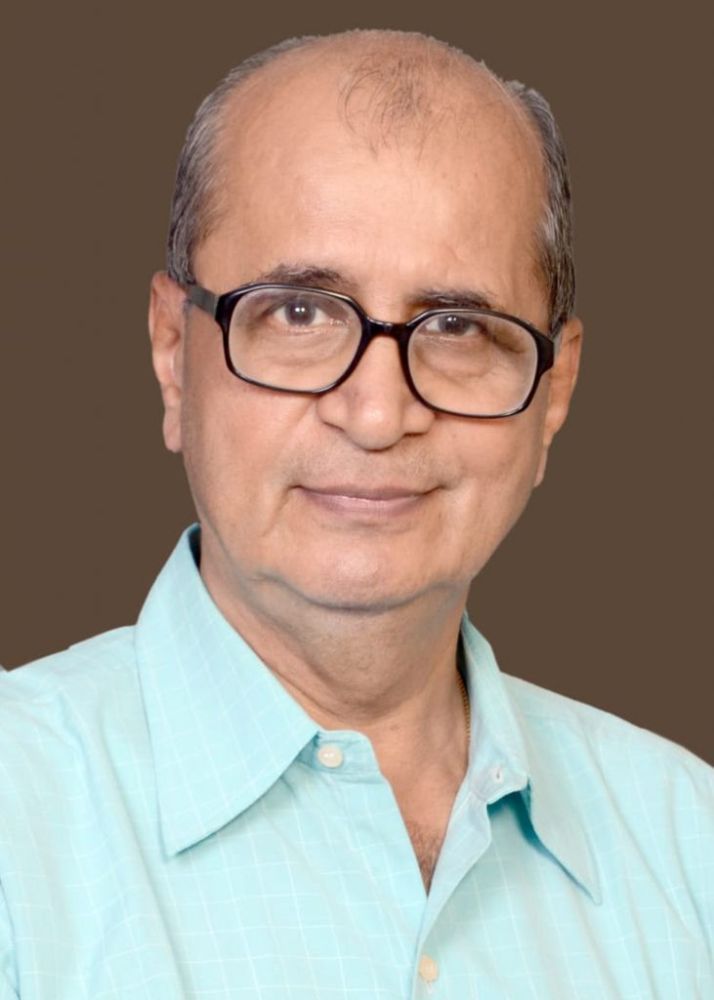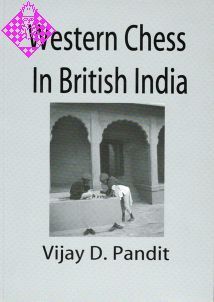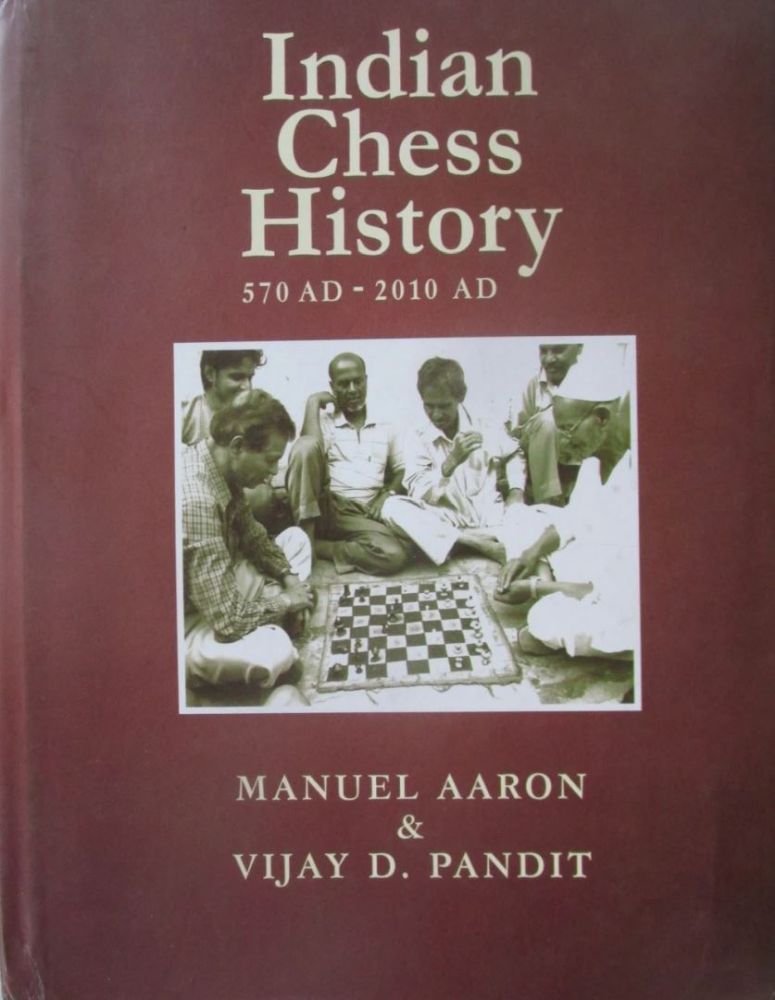Remembering the chess historian Vijay Pandit (1945-2021)
On 27th April 2021, chess historian Vijay Pandit succumbed to the Covid-19 virus. Apart from writing numerous articles on chess history, he had authored quite a few books. Among them, he co-authored Indian Chess History 570-2010 AD with India's first International Master, Manuel Aaron. Vijay Pandit's contribution to our knowledge of Indian chess history has been immense. One cannot take a proper step forward without learning about the correct historical facts. Aaron got to know about his friend's passing two months after he left the mortal world. A heartfelt eulogy written by Manuel Aaron that we publish on the 1st death anniversary of his dear friend. Photo: chessnewsandviews
Vijay Pandit - A Eulogy
By Manuel Aaron
It is with great sorrow that I record the death of my friend Vijay Dwarakanath Pandit, with whom I jointly authored Indian Chess History in 2014. Born in Ratnagiri on 19 June 1945, Pandit succumbed to Covid19 on 27 April 2021 in Mumbai. He was 76.

Pandit’s early life was in Pune where he did his Engineering. He moved to Bombay in 1972. There, he got his PG Diplomas in Management Studies and Computer Applications, passing with First Class Distinction.
Pandit told me that his interest in chess came about by dint of the beautiful game in which Arun Vaidya defeated me at the 1972 National Championship in Simla! After that he started collecting any statistic or object that related to chess. In due course he had such a wealth of information starting with the smallest tournament reported anywhere that he called himself “The Only Chess Statistician of India”. Even though I told him that he was the “Only Chess Historian of India” he was content to be known only as the ‘Statistician’.
Pandit in CCAI and AICCF
Between 1973 and 1998 he played over the board chess as well as Correspondence Chess. In 1977, he became the editor of the official organ of the Correspondence Chess Association of India, the CCAI Bulletin. When the CCAI Secretary Mark Nelson (1920-1985) died Pandit became the Interim Secretary and remained so till Ashukaran Goswami (1899-1994) of Bikaner took over.
After the CCAI moved to Bikaner, its chess activities gradually ground to a halt though it continued as a member of the AICF and regularly voted at AICF elections. To revive Correspondence Chess, Pandit joined hands with my son Arvind Aaron and founded the All India Correspondence Chess Federation, independent of the AICF. Pandit edited the new organization’s magazine “The AICCF Bulletin” from 1993 to 1998.
Unpaid Chess Journalist
A prolific writer, Pandit contributed chess articles in English and Marathi to anyone requesting it. Almost every souvenir brought out by chess organizations to commemorate a tournament had an article by Pandit. He had written for Karpov’s “Sovietskaya Entsyklopaedia” in 1988, and Tim Harding’s “Chess Mail” in Ireland.
Through his incessant reporting of historical happenings he became India’s foremost chess historian. In 2009 he translated, edited and improved the historic 1941 Marathi book Buddhibalacha Khel (Deshi aani Pashchatya Paddhati) of V.G.Padsalgikar (1895-1971) of Sangli. That book had described the Indian chess scene of the 1930s. It was published by Anthony Gillam of The Chess Player, from Nottingham under the title “The Game of Chess (Native and Western Methods). The Chess Player also published his Tournament book, “Ahmedabad 1955” (won by R.E.Fontana) in 2010 and “Western Chess in British India” in 2011. When Gillam offered to pay him for his work Pandit, a simple person who valued friendship and service above all, asked only one thing: the software, ChessBase!!

In 1989, he authored a Marathi chess book “Buddhibalateel Gamatee Jamatee” (Anecdotes in Chess). He possessed a large number of rare chess books and artefacts dating back to as early as 1885.
A highly qualified engineer, he worked for Godrej. He told me that Godrej had discreetly supported his chess activities. Because of this, even now I always buy Godrej products, which are of high quality anyway!
Pandit and I were diametrically opposed in many things, but not in Chess which ruled our lives. He was a Gaud Saraswat Brahmin from Pune whereas I am a Tamil Christian. Pandit’s passion for Sanskrit (he called it Sanskrut) was noteworthy. On the other hand, any language was good enough for me if it could communicate.
Politically he was a BJP fan whilst I considered most political parties to be crooks who lived on false promises. In chess politics he was an ardent admirer of the AICF Secretary Ummer Koya (1951-2020) whereas I belonged to the group of Secretaries of the Delhi, Maharashtra and Tamil Nadu State Chess Associations who got the Madras High to dethrone Koya in 2005.
Walking Chess Encyclopedia
In chess matters, without a doubt he was an Encyclopedia. Whenever I wanted any information on who won a particular tournament in a certain year, or what was the date of birth of a player or organizer, he had the pat answer, with photo copies of newspaper reports as proof. All this meant that he had thousands of paper cuttings filed in an organized manner in his flat. Inevitably time came when the mass of historical old papers in the home became sheer clutter and his wife decided to articulate: “Enough is enough! Get rid of all this rubbish, or......!” Only then, did Pandit junk some of the papers and books and give away the most valuable documents to Tony Gillam of The Chess Player, Nottingham, England. I remember Pandit telling me that his understanding with Gillam was that he, Gillam, would use the material in any way beneficial to chess but eventually donate it to the British Library. Gillam is a well-known chess writer and publisher of many famous tournament books like Manheim 1914, Berlin 1907, Hastings 1922/23, etc., all of which are deeply researched and most interesting.
I was also the beneficiary of a shedload of old VDP documents which he must have sent with a resigned, heavy heart. However, his love for the rotting, discoloured documents lurked in his mind and after a year or so, he wanted this sack-load and I sent it back! That was our friendship! We understood each other’s strengths and weaknesses. Pandit was a straightforward gentleman. He would keep his word, no matter what. He was one among my few chess acquaintances in India who would call me by my first name. And I called him Vijay.
December Greetings
Last December, he phoned me as usual on my birthday and we exchanged notes on how we were coping with Covid19. He told me that he and his wife never go out as they got all their groceries and vegetables from the store run by their large Housing Society for its residents. I told him that our needs in Chennai are taken care of by my son Arvind who lives in the Flat above ours. Then we lost touch. I feel guilty that I never called him after December. I never imagined that a disciplined and methodical person like Pandit could fall prey to this virus and leave this world so quickly.
Covid Strikes
Pandit, a diabetic, his wife Mangala and daughter Dipali, were all afflicted by Covid19. All three had had their first Covaxin jab in the last quarter of March 2021. While Pandit and his wife lived in their Mahim flat their two daughters, Vaishali and Dipali, both married to engineers, and their families lived close by. When necessary, Pandit went to his bank. And he scrupulously followed the health protocol laid down by the Government of wearing a mask and social distancing. When he returned home after such rare trips he put all his clothing out for wash and took a bath.
Nevertheless Covid struck. His wife was admitted to the Hinduja Hospital in Mumbai whilst Pandit himself could not be admitted. It is said that getting admission in the Hinduja Hospital is as good as getting cured. Pandit ended up in the BKC (Bandra Kurla Complex) which is a Government jumbo medical facility set up especially for Covid19 patients. Sadly, the virus could not be controlled and he died after a 15-day struggle on 27th April. Pandit’s wife was told of his death only after she returned home from hospital. She is gradually recovering from the virus but still suffers from its after effects and the unexpected death of her husband. Their daughter Dipali had self quarantined at home and is now OK.
With three in their small family afflicted by the virus the others must have also feared the worst and given priority to survival over other matters. When the latest copy of Chess Mate was delivered at Pandit’s flat, his younger daughter Dipali saw it and realised that the chess world was unaware of her father’s death and called Arvind. That is how we became aware of Pandit’s demise two months after it happened.
Pandit leaves behind his wife, two daughters, their spouses and two grandsons.
If the historical chess book, Indian Chess History, published in 2014 is a big success it is because Pandit helped me with vast amounts of forgotten and ‘untraceable’ data. I know that in search of information, Pandit made several painstaking visits to libraries in Mumbai like the Mumbai Marathi Granth Sangrahalaya. That fountain of wisdom and source of information is no more and we are all the poorer for it.

If Pandit became a life-long chess addict, it was because of this game, my loss to Arun Vaidya:
Tributes to Pandit
Anthony J Gillam of The Chess Player, Nottingham, England:
“Vijay and I live a long way apart and so we have never met. Because of our mutual interest in chess and its history, we met by email and I was very happy to receive information and help from him on some Indian chess events of many years ago. His efforts and successes at resurfacing events from India’s chess history should be widely appreciated. Today’s successes by Indian players are happening partly because of the earlier activities of previous generations of players. These activities need to be recorded and Vijay was one of the main researchers who are ensuring that happens.
My condolences to his family. I hope that someone takes his place and manages to achieve his high standards.”
Rakesh Rao, Correspondent, The Hindu, Delhi
The concern of Mr. Pandit's family is understandable. One feels for Mrs. Pandit who had to deal with Covid and this catastrophic blow. I have seen quite a few of my friends' family members undergo a state of shock for months after losing a loved one. Mr. Pandit's daughters and sons-in-law, too, must have gone through unimaginable mental trauma, since their parents/parents-in-law were in different health care Centres.
Golfer Jeev Milkha Singh faced a similar situation. His parents, father Milkha Ji (the Flying Sikh) and mother Nirmal Ji, were in two different hospitals. Worse, both did not make it. These are very challenging times. What I notice is that the mental health of a lot of people has taken a hit. I see a distinct lack of sensitivity - or call it plain selfishness - in some of those blessed to escape the wrath of this pandemic. They refuse to lend a helping hand, fearing they could be in danger, too. I understand what it is to be careful. But being insensitive or indifferent is quite different.
D.V.Sundar, Vice President, FIDE, Chennai
Dear Aaron I know how much you respected Mr Pandit. Very difficult to replace such people who are not interested in chess politics but serve the game in their unique way. May his soul rest in peace.
Source: Chess-Mate August 2022 issue



